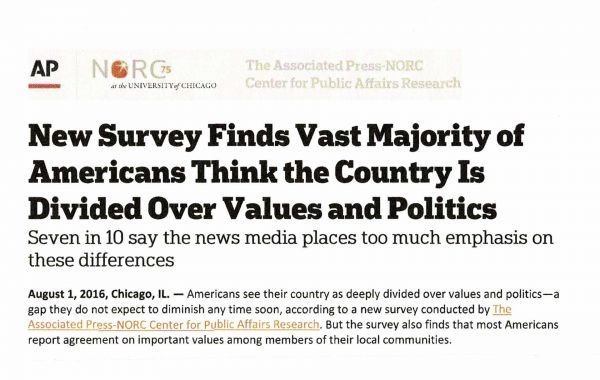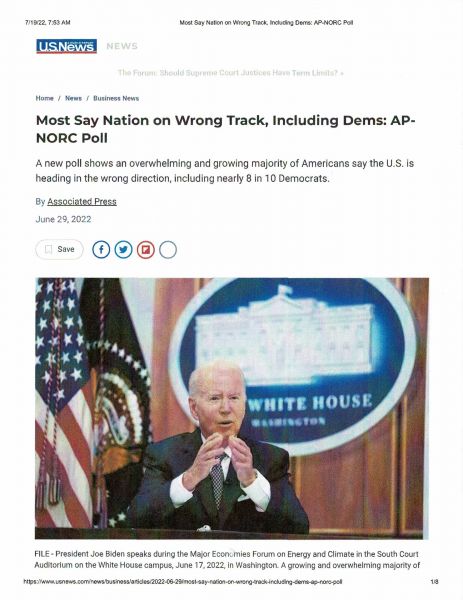The Stats on the NORC poll, June, 2022
A poll conducted in June of 2016 by NORC-AP asked American voters for their opinions about the upcoming Presidential Election, scheduled for November of that year. The results, published on the NORC website in August 2016 should not have surprised anyone, but I admit the data surprised me. NORC-AP reported that "Eighty percent of Americans say the country is greatly divided when it comes to the most important values, and 85 percent say the United States is increasingly divided by politics."
Moreover, NORC reported that only "43% of voters say a Hillary Clinton's election would lead to a more divided country. Many more, 73 percent, say the country will be more separated if Donald Trump prevails in November."
These figures made me curious. Since nearly half the voters actually voted for Trump, the statistics would say that some of those voting for him also figured that his presidency would lead to a more "separated" nation. They understood the consequences and voted for him anyway. This indicated a significant level of dissatisfaction among Republicans with the status quo.
NORC-AP continued to record American opinions throughout the Trump tenure of office, and again after the election of Joe Biden in November, 2020. In June, 2022, for instance, NORC published a new poll, and its numbers should concern us: "Most say nation on wrong track, including Dems."
The Democrat respondents believe Biden and Democratic Congressmen have compromised on the issues too easily. They expected more definitive policy-making. Some Democrat respondents blame Republicans in Congress for stalling Democrat efforts to move forward.
But the poll states that "The national dissatisfaction is bipartisan." The polling numbers record that "Ninety-two percent of Republicans and 78% of Democrats say the country is headed in the wrong direction." But if I asked the respondents, "Tell me which is the right direction," they would point in opposite directions—the Democrats to the left, the Republicans to the right, and they hate for their Congressmen to compromise. Most Americans hate the word "consensus," which lets the voters know they get no more than a 50% solution—too watered down to serve their needs, or the nation's needs, for that matter. Haven't the voters had enough of governing that leaves both sides dissatisfied with the result?
In this post, I would like to analyze the anatomy of the nation's division, to suggest to voters that they should not count on the situation improving. The situation starts mostly with their self-interest, which derives from their philosophical and administrative sense of what works and what does not work. And beyond philosophical disunity, there is institutional disunity—resentment and paranoia toward the opposing party—that remains after every setback.
Many of us are institutional type people. We take our marching orders from it, our talking-points, and general outlook; but the institution exists as its own deal. The institution looks after itself and does not like anyone stirring up angst against the status quo, because dissent upsets its functioning. The institution—okay, the political party—may lose twenty elections in a row, but it provides jobs, talking points, and vision to thousands of people. Realigning its positions, changing its culture, or reconfiguring its basic vision frightens people—who use the party to define themselves.
But everyone should realize, by now, that we can't keep going on like this—expecting a miracle, or whatever. What I espouse and recommend to Americans is a non-vindictive, non-violent, and non-dictatorial solution—Divide the nation and govern separately. We should divide it, or else plan for our democracy to degenerate into a dictatorial majoritarianism—where it is headed at present.


